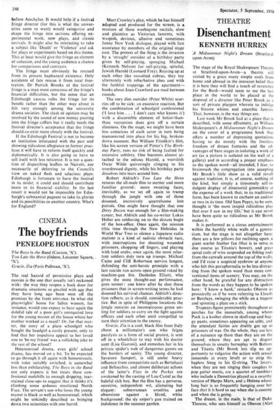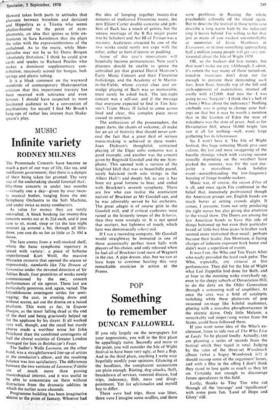THEATRE
Disenchantment
KENNETH HURREN
A Midsummer Night's Dream (Stratford- upon-Avon)
The stage of the Royal Shakespeare Theatre at Stratford-upon-Avon—a theatre still visited by a great many simple souls from home and abroad in the innocent belief that it is here they will find a touch of reverence for the Bard—would seem to me the last place in the world to be placed at the disposal of a director like Peter Brook as a sort of private playpen wherein to indulge his bizarre whims and anarchic fancies. That, however, is the way things are.
Last week Mr Brook had at a piece that is described, with some effrontery, as William Shakespeare's A Midsummer Night's Dream on the cover of a programme book that offers a number of depressing quotations having to do mostly with the limitless freedom of dream fantasies and •the ad- vantages of bare stages in isolating a work of art (as a picture is isolated on the wall of a gallery) and in according a proper emphasis to the spoken word—all intended, I fear, to brainwash the congregation into accepting Mr Brook's little show as a valid revolt against tradition. It is, of course, nothing of the kind, but simply a tiresomely self-in- dulgent display of directorial gimmickry at the expense of a work that, in its traditional form, has been known to enchant an auditor or two in its time. Old Sam Pepys, to be sure, thought it 'the most insipid ridiculous play that ever I saw in my life,' but it can never have been quite so ridiculous as Mr Brook makes it.
It is performed as a circus entertainment within the harshly white walls of a gymna- sium, but the stage is not altogether bare: there are a few pillows for reclining upon, a giant scarlet feather fan (that is to serve in due course as Titania's bower), and great spiral coils of wire suspended on fishing rods from the catwalk around the top of the walls, and I'd raise a sceptical eyebrow at anyone who felt this paraphernalia to be less distrac- ting from the spoken word than more con- ventional items of scenery. You may, on the other hand, be grateful for any distraction from the words as they happen to be spoken here: 'I know a bank,' remarks Oberon as prosaically as if he were referring to Lloyds or Barclays, swinging the while on a trapeze and spinning a plate on a stick.
Trapezes figure prominently throughout as perches for the immortals, among whom Puck is a kosher clown in skull-cap and bag- gy pants, sometimes appearing on stilts, and the attendant fairies are drably got up as prisoners of war. On the whole, they are less of a nuisance up there than they are on the ground, where they are apt to disport themselves in smutty horseplay with Bottom and Titania (Mr Brook lets slip no op-
portunity to vulgarise the action with sexual innuendo at every level) or to strip the hapless Snug to his G-string. The lovers, when they are not singing their couplets to pop guitar music, are a quartet of tumblers
who include a Demetrius played as a swarthy version of Harpo Marx, and a Helena whose long hair is so frequently hanging over her face that it is hard to say when she is coming and when she is going.
The dream, in the main, is that of Duke Theseus, who sees himself as Oberon (Alan Howard takes both parts in attitudes that alternate between boredom and derision) and Hippolyta as a Titania who seems phallus-fixated to the point of nym- phomania, an idea that ignites so little en- thusiasm in Sara Kestelman that she plays the roles with the expressionlessness of the embalmed. As to the music, while Men- delssohn may not be to Sir Denis Brogan 'absolutely first-class,' I think he could give cards and spades to Richard Peaslee who makes a dominant supplementary con- tribution, raucously scored for bongos, bed- springs and plastic tubing.
It is a bleak comment on the wayward standards of contemporary Shakespearian criticism that this impertinent travesty has been received with tolerance and even fervour. I should have suspected its most fascinated audience to be a convention of psychiatrists; for myself I find Mr Brook's hang-ups of rather less interest than Shake- speare's play.































 Previous page
Previous page